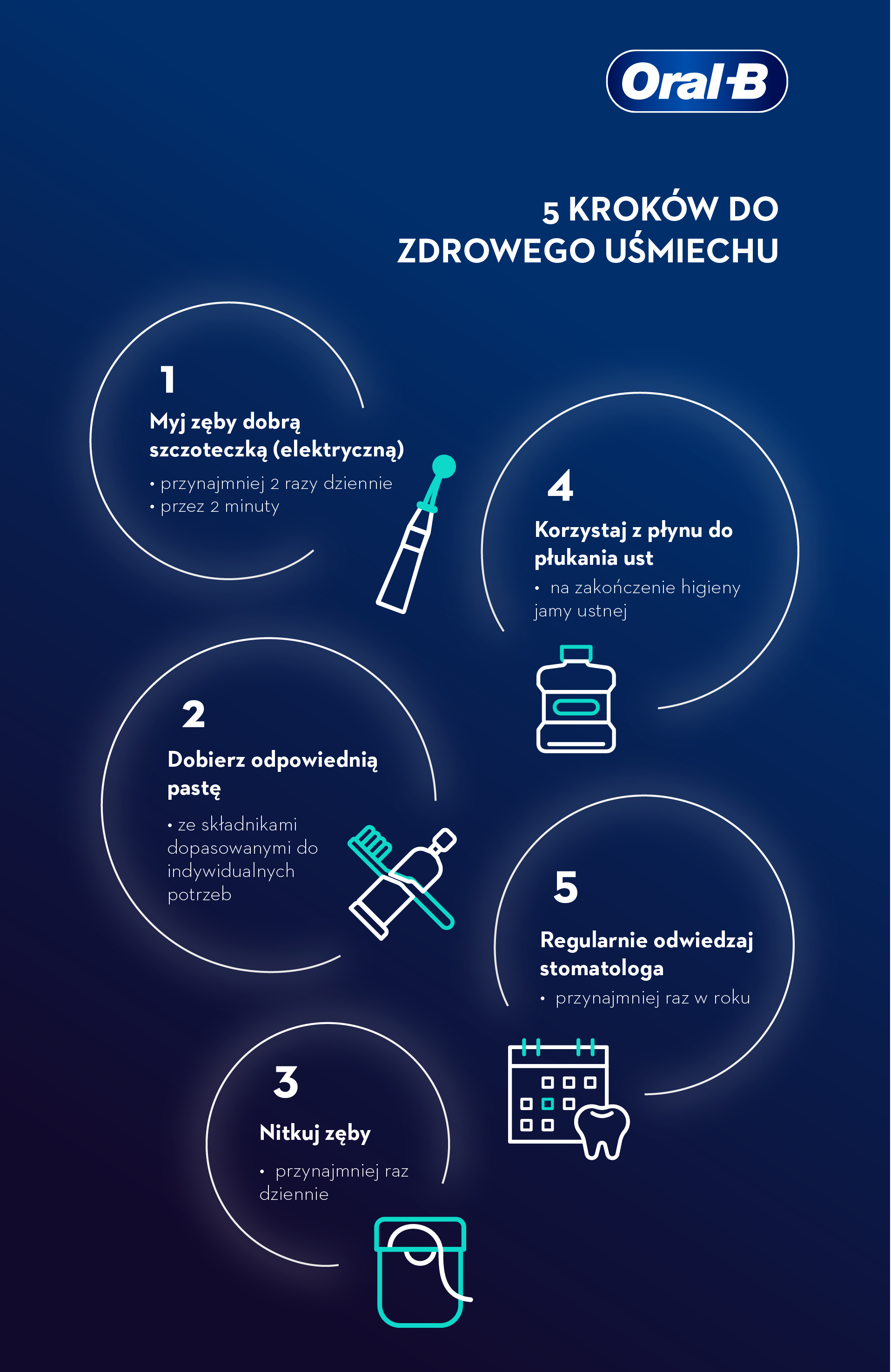20 March marks World Oral Health Day - this most important dental holiday prompts people to pay attention to their daily hygiene habits. They affect not only healthy teeth and gums, but also the health of the body. The Polish Dental Association and the Oral-B brand are conducting intensive educational activities throughout the month, and free dental check-ups with instruction in proper oral hygiene await patients. Experts emphasise: Health begins in the mouth!
Healthy teeth are not only an aesthetic dimension - neglect and periodontal disease can have serious consequences for the whole body, affecting the development and course of diabetes, vascular and cardiovascular diseases or the nervous system, among others. Many dental problems are underestimated and, in the long term, may require consultation not only with the dentist, but also with other specialists in systemic diseases. It is worth taking care of your health holistically by remembering to take proper care of your mouth - points out Prof. Marzena Dominiak, President of the Polish Dental Association.
5 steps to healthy teeth and informed oral care
- Brush
The basic element of oral care and health is, of course, brushing the teeth. This requires the right toothbrush to effectively get rid of lingering debris and plaque. Which toothbrush and technology should I choose?
Numerous studies confirm the superiority of electric toothbrushes over manual toothbrushes, so the first answer is an electric toothbrush. When choosing a toothbrush, it's worth remembering that toothbrushes with a traditional elongated head, such as manual or sonic brushes, require an appropriate cleaning technique and sweeping motion that can be challenging for the user. An alternative is the innovative magnetic technology used in the latest Oral-B iO toothbrushes. Thanks to oscillating-rotating movements combined with micro-vibrations, the bristles themselves sweep away bacterial plaque and the small round tip adapts to the shape of each tooth and reaches even the hard-to-reach areas. The user therefore doesn't need to make any additional movements - simply place the head against the tooth and the magnetic toothbrush does the work for them.
An important aspect of brushing teeth is brushing time. Although most people know that we should brush for 2 minutes, in the daily rush we often cut this time short. That's why it's a good idea to choose a toothbrush with a built-in timer to keep track of how long you brush. Oral-B iO toothbrushes, in addition to signalling the brushing time with a short vibration, also have a display that measures the brushing time.
- Toothpaste
An integral part of brushing your teeth is toothpaste. The products available on the market are tailored to various needs and preferences, and help care for an oral cavity that is struggling with various problems. Among the types of toothpaste, one can find those designed for teeth with hypersensitivity, decay or tartar accumulation, but also for gum problems or bad breath. Some products have whitening properties.
It is worth getting a specialised toothpaste that contains substances that make it highly effective. Such products include antibacterial toothpastes with stannous fluoride - all Oral-B toothpastes for permanent teeth have this ingredient, anti-tartar pastes with sodium pyrophosphate, or whitening pastes with chemical and abrasive ingredients to get rid of stains.
- Dental floss
The third step on the way to healthy teeth is dental floss. It cleans hard-to-reach interdental spaces where food residues may remain even after brushing. Flossing helps to get rid of bacteria and bad breath and prevents inflammation and decay.
- Rinsing liquid
Rinsing with mouthwash helps to remove food debris and is great for freshening the breath. As among toothpastes, the market offers products with different formulations. From standard liquids with alcohol, to alcohol-free liquids and fluoride rinses. Remember that the mouthwash is not a substitute for brushing your teeth and is used at the end of your daily oral hygiene routine.
- Visits to the dentist
All oral health care is complemented by visits to the dentist. Regular check-ups will detect abnormalities at an early stage and prevent more serious consequences. The specialist will also remove plaque build-up and advise on proper care of the teeth and gums.
For our doctors, the most important thing is the health of our patients, and this is largely based on prevention. The effects of improper hygiene may appear only after many months, which is why it is recommended to visit the dentist at least once a year.. We want to remind people of this especially now - in oral health month and during the pandemic period, during which there is no contraindication to visiting the dental surgery according to the sanitary regime. - adds Dr. n.med. Beata Golan, Head of Scientific Affairs at P&G Poland.
Thanks to the efforts of the Polish Dental Society, March is celebrated as Oral Health Month. As part of the PTS campaign "Poland says #aaa!" Oral-B brand together with partner practices and LUX MED Dentistry invite patients to booking of free dental check-ups combined with instructions on correct oral hygiene. More than 2,000 free visits are offered in 20 LUX MED Stomatologia outlets and 23 Oral-B partner offices in cities across Poland. Detailed information is available on the campaign website under the link https://polskamowiaaa.pl/

